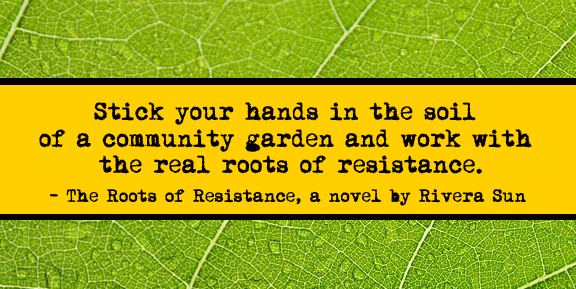One of the great joys of my life is having a front-row seat to some of the most innovative, inspiring, solutionary work that’s going on. Over the 10+ years since I wrote The Dandelion Insurrection, I’ve found enduring hope in learning how people are building new systems in their local communities, solving problems, and strengthening connection. Of course, these ideas have made their way into my novels … hoping that people like you will be inspired to plant the seeds of these ideas in your local community. Here are some of my favorites from the many examples across the Dandelion Trilogy:
In The Dandelion Insurrection:
Rights of Nature – Do rivers, forests, mountains, oceans have inalienable rights? I think so. And I’m not alone. There’s a growing movement to acknowledge, assert, and defend the rights of nature, from the Ganges River to Lake Superior and beyond.
Suburban Renaissance – In the novel, this network of community-building, resource-sharing suburban families are engaging in economic resistance to consumerism, knowledge-building, and resistance training. Imagine if this was going on in your neighborhood. Want to get started? Shareable has 300+ toolkits on how-to-share. They cover things like tool coops, Little Free Fridges, time banks, and more.
Victory Gardens for People & Planet – Grow some change. Share some food. Victory Gardens were popularized during the World War II war effort. In the nonviolent movement of the Dandelion Insurrection, the gardens are used to feed people when the gap between the rich and poor shoves people into poverty and hunger. Gardens have many other benefits, too, including care of the earth (if done without chemicals), greening the urban environment, building community, and taking some of the food supply out of the hands of megacorporations. No garden space? Grow some herbs in a pot on your windowsill and share a sprig of rosemary with your neighbor.
In The Roots of Resistance:
Debt Strike – In 2017, when The Roots of Resistance was published, the idea of a debt strike seemed wildly implausible. I almost hesitated to put it into the novel, but I knew some interesting activists were organizing to hold one. So in it went. Since the book came out, a successful student debt strike against the scam of Corinthian Colleges opened the door for broader student debt forgiveness programs. Check out the work of the Debt Collective to learn how this tactic can be applied all kinds of debt.
Community Schools – When a corporation tries to privatize a public school, the community mobilizes to resist. One of their tactics is to launch a pop-up school when the students and teachers strike against the private company’s occupation. Providing education and resistance organizing, the intergenerational campaign wins back their public school. Education is a frontline these days – a fraught point of struggle between ideologies of fear and hate, and worldviews of inclusion and respect. It’s important to show up for this struggle in your local community. The future depends on it.
In Winds of Change:
Disaster Resilience – After I read the interesting reports on disaster collectivism in the Response Podcast (and the book version), I knew I had to weave a scene of community-led disaster resilience into Winds of Change. Real life examples show that a strong, interconnected community is the most important part of resilience – as character Bramble Ellison finds out when a forest fire sweeps through her town.
Council of All Beings – I’ve long drawn inspiration as both an activist and an author from the Work That Reconnects, pioneered by Joanna Macy. Both Steam Drills and Winds of Change feature scenes that follow ritual and processes that this real-life work has developed and led in communities worldwide. Holding these circles, exercises, and participatory rituals in your local area can make space for emotions, creativity, soulfulness, and transformation.
Solutionary Rail – Charlie and Zadie take a ride across the country on a Solutionary Rail line powered by renewable energy. This visionary idea is being worked on by climate activists and railroad workers. It’s a big challenge – with a big potential payoff for rapidly transitioning away from fossil-fuel based transportation. Everyone should support this idea!
The Democracy Lab – Participatory democracy is the way forward, imo. There are many styles, flavors, and practices to explore in how we make decisions together. I’ve learned a lot from my colleagues at the Co-Intelligence Institute and by following efforts around participatory budgeting, direct democracy, citizens councils, and more. My rule of thumb: start infusing your life with some democracy practices, whether that’s with your family, or by joining a credit union, or supporting worker cooperatives, etc.
These are just a few of the many real-life ideas that made it into the pages of the Dandelion Trilogy amidst the action-packed plot lines of nonviolent resistance. These constructive programs give us tangible ways to build the world we want to live in and strengthen our ability to wage struggle against injustice. To me, they bring life and breath and hope to the stories.
Thanks for joining me in celebrating 10 years of life inspiring fiction, and fiction inspiring life,
Rivera Sun
